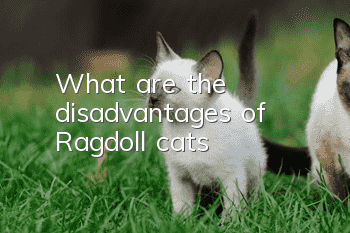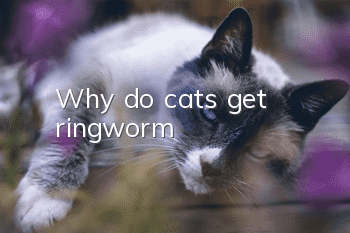Why do cats always bark at me? Do you love me?

What should I do if my cat meows so much that it seriously affects my sleep and disturbs my neighbors? Is it in estrus? In fact, being in estrus is just one of them. There are many reasons that may cause cats to meow very much. Today, let’s review why cats meow so much. Love to bark.
Why do cats meow? There are actually many reasons, mainly three categories:
Category 1: Experience learned in the past
1. The habit of being overly pampered by the owner
Cats are very smart animals. They can know that barking can attract human attention, and they can get what they need, such as food, rewards, play, etc. However, most owners, especially girls, will A cat that can't resist meowing will "give up and surrender" when the cat becomes a little cute and meows twice, which is exactly what the cat wants. From then on, cats will become more adept at using meows to obtain resources. After all, cats will be more confident if they are favored.
Category 2: Environmental factors
1. Anxiety and uncertainty (i.e. stress issues)
When a cat is anxious and feels unsure about the environment, and has strong feelings of uncertainty, it will increase the cat’s uneasiness and vent it through meowing. There can be many reasons for anxiety and uncertainty. Anything that makes a cat feel threatened or causes fear can cause anxiety, such as cats outside, loud noises, moving, strangers visiting, being locked in a cage, etc. wait.
Note: If a cat meows and your solution is to punish it and try to shut it up, this may increase the cat's anxiety and may make the cat afraid of you, although sometimes the cat really does not meow. However, if emotions cannot be vented through barking, they can only be expressed through other behaviors, such as urinating. So punishment is not a good solution.
2. Insufficient resources
When a cat’s basic needs such as eating, drinking, playing, sleeping, etc. are not met, the cat will naturally ask for it through meowing, just like a hungry person will say that he is hungry and wants to eat. Cats’ basic needs include: the right food, enough food, adequate water, the number, type, location, cleanliness of litter boxes, a place to sleep, and an area to play (climbing, claw grinding, hunting, etc.) , have good interactions, etc. In other words, if a cat is too bored, it will also meow because its need for play is not being met.
Category 3: Genetic predisposition
1. The instinct of kittens
Before the kitten is weaned, the kitten is completely dependent on the mother cat for protection, and the most direct communication between them is the meow. The kitten calls the mother cat through the meow. Anyone who has ever raised a kitten knows that if the kitten isWhen a mother cat is separated, the kittens will meow very loudly. So if your cat has just been weaned and brought home, and the cat keeps meowing, then we need to understand. First, it is the first time that they leave their mother. They are very scared and try to call her mother to come and protect themselves. Second, as mentioned above Anxiety and uncertainty lead to stress.
2. Sexual maturity
As a cat matures sexually, the cat will go into estrus, which may be followed by meowing, hoping to attract the other half through the meowing. This is also due to the genetic nature of cats.
Three, varieties
Like dogs, different breeds of cats like to bark to different extents. This is written in their genes. For example, Siamese and Pastoral cats bark more than British Shorthair and Garfield. If you don’t If your cat is a talkative cat, you can choose a breed with a calm and quiet temperament.
Category 4: Impact of disease
1. Any disease that can increase blood pressure, increase hunger, or cause pain:
There are no specific diseases here, because there are too many types of diseases, and they may cause or promote excessive meowing in cats, such as gastrointestinal diseases, kidney diseases, lower urinary tract diseases, joint diseases, etc. Illnesses, neurological disorders, etc., the pet needs to be taken in for a complete physical exam and any necessary diagnosis to rule out all possible causes of the disease.
What should I do if my cat meows?
1. Eliminate possible causes of disease:
Take your cat for a complete physical exam and any necessary diagnostics, such as blood, urine, biochemistry, ultrasound, and X-rays. To rule out whether the cat is uncomfortable and barking due to disease. Once the disease is diagnosed, a treatment plan can then be developed.
However, note that sometimes treating a disease may only improve the condition, such as treating arthritis, thereby reducing pain and reducing the cat's meowing. But the behavior may not stop because it may have become a habit.
2. Solve the basic behavioral needs of cats and ensure sufficient and appropriate resources:
Meeting your cat’s needs, including the correct type, amount and frequency of food, water availability, number, type and location of litter boxes, type of litter, cleanliness, comfortable sleeping area, A place where you can sharpen your claws, climb high, and have your favorite social interactions.
To put it simply, prepare what should be prepared so that the cat does not need to waste words to remind you, including timely massage and playtime.
3. Find and eliminate stressors and eliminate the cat’s anxiety and uncertainty
Anything that can cause anxiety, uncertainty, and fear in cats may be a stress source. If possible, it is best toIt is best to eliminate stressors, for example, not taking the cat out, protecting the cat from strangers or naughty children, setting up a safe hiding area for the cat, allowing the cat to hide in its own safe area, etc.
If the stress source cannot be eliminated, we should try our best to avoid or minimize the stress. For example, if a cat outside causes anxiety in the cat, then we should prevent the cat from seeing the cat outside. You can close the curtains. Or keep the cat away from the window so it can't see.
IV. Avoid punishing behavior
As mentioned above, this may increase the cat’s anxiety, and may also make the cat afraid of you, bringing your relationship to a freezing point.
5. Age-appropriate adoption and age-appropriate sterilization
Some owners will separate the cat from the mother cat when the cat is less than two months old. This will not only affect the cat's health and cause it to be weaned prematurely, but also prevent the cat from fully learning necessary Skills and interests, i.e. socialization learning is not enough. Moreover, it is most normal for cats of this age to meow. So you can adopt an older one. Usually adult cats are less meowing than kittens. After age-appropriate neutering, cats will no longer be agitated due to estrus, and they will no longer need to meow to attract the opposite sex.
6. Establish a routine and predictable daily activity schedule:
Start taking action before the cat starts to seek attention, add some shorter and more frequent activities, add reward training, games, food, toys, etc. to keep the cat awake during the day or night and consume the cat's energy. This helps cats sleep better in the middle of the night and reduce attention-seeking behavior.
7. Finally and most importantly: do not reward any type of attention-seeking behavior, including barking.
We must learn to meet the cat’s needs in advance and ignore the cat’s attention-seeking behavior until the cat calms down. In other words, if the cat meows because it wants to eat, we need to ignore it and give food or rewards before meowing or after the cat calms down.
- Can Cat Sanlian and rabies be vaccinated together? Young cats should pay attention to vaccinations!
- Will cats vomit when pregnant?
- How to cultivate a good daily routine for cats? A must-read for cat lovers!
- Should cats be trained from an early age? Cat training tips!
- Why do cats like to rub their butts?
- What should I do if Jinjila has soft stool?
- Why is it not recommended to keep Bombay cats?
- What are the signs that a cat is uncomfortable?
- What should I do if my cat’s leg is broken? Application of orthopedic bandages for cat fractures!
- How to use deworming medicine for cats



